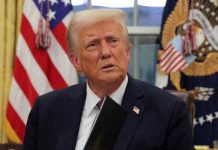DM Monitoring
Ankara: Turkey has been experiencing a major foreign trade gap with most of the member countries of the recently concluded world’s largest free trade agreement – a table that puts forth a need for a new foreign trade strategy to change the picture in favor of Turkey, according to a chairperson of a major trade association.
Turkey’s exports to China and 14 other countries that last week set up the world’s largest trading bloc, agreeing on the Regional Comprehensive Economic Partnership (RCEP), stands at $7.1 billion (TL 55.01 billion), while its imports reached $36.1 billion, said Jak Eskinazi, the coordinating chairperson of the Aegean Exporters’ Association (EIB).
“Turkey posts a foreign trade deficit with 12 of the 15 countries,” Eskinazi told Daily Sabah. “It turns out that a new foreign trade strategy is needed to change this picture in favor of Turkey,” he said.
Backed by China, the deal encompasses nearly a third of the global population, namely 2.2 billion, and about 30% of its global gross domestic product (GDP).
It includes China, Japan, South Korea, Australia, New Zealand and the 10 members of the Association of Southeast Asian Nations (ASEAN), namely Brunei, Vietnam, Laos, Cambodia, Thailand, Myanmar, Malaysia, Singapore, Indonesia and the Philippines, but not the United States.
The deal also marks the first time China, Japan and South Korea have been brought together under a single trade agreement – a process that has been otherwise marred by historical and diplomatic disputes.
India was also involved in early discussions but opted out last year over concerns related to cheap Chinese imports. Member states have said there is still room for India to join the RCEP.
“We can safely say that the weight of the global economy is shifting from West to East,” Eskinazi noted.
He also says the RCEP is a major win for China.
“Beijing has now taken new allies on its side in the trade wars between the United States and China. We can underline that China, which aims to take the leadership of free trade in the world from the United States, has achieved significant success in achieving this goal,” he explained.
A U.S.-China trade war and U.S. President Donald Trump’s “America First” retreat from predecessor Barack Obama’s “pivot” toward Asia is said to have given impetus to complete the RCEP, which is widely seen as Beijing’s chance to set the regional trade agenda in Washington’s absence.
The U.S. is absent from both the RCEP and the successor to the Trans-Pacific Partnership (TPP), leaving the world’s biggest economy out of two trade groups that span the world’s fastest-growing region. The agreement will progressively lower tariffs and aims to counter protectionism, boost investment and allow freer movement of goods within the region. “The RCEP agreement means a birth of a major market with a population of 2.2 billion,” Eskinazi said.
In the case India joins the agreement, he said, Turkey’s foreign trade deficit will jump to $34.41 billion.
According to 2019 data, Turkey had imported around $19.13 billion worth of goods from China, $5.77 billion from South Korea and some $3.65 billion from Japan.



